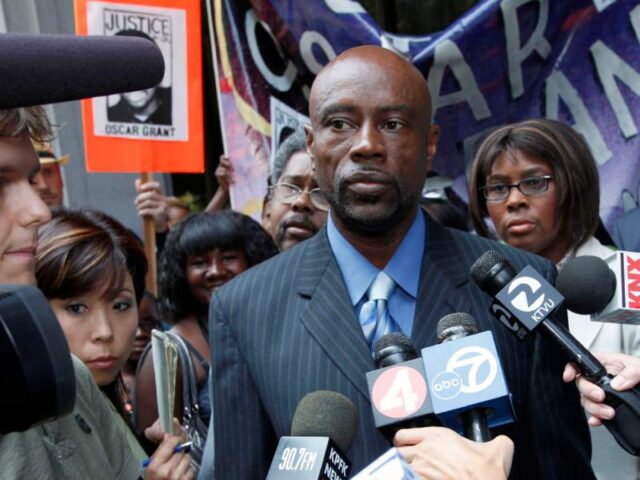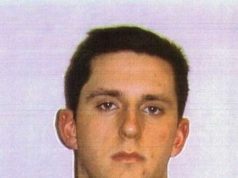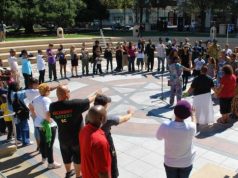
(7/1) — UPDATED 22:20 PDT — LOS ANGELES — The prosecution in the murder trial of Johannes Mehserle, the former BART Police officer who shot and killed unarmed passenger Oscar Grant on New Year’s Day 2009, urged a Los Angeles jury to convict Mehserle of second-degree murder during its closing argument today.
But the defense said the prosecution had not proven that Mehserle intended to shoot Grant beyond a reasonable doubt. “This was an accident, folks. Clear and simple,” Mehserle’s defense attorney Michael Rains said.
Prosecution: shooting a “deliberate act”
“It can never be lawful to shoot an unarmed man when that man is face down in the process of putting his hands behind his back,” Alameda County Deputy District Attorney David Stein told the jury.
Mehserle “chose to ignore everything he was ever taught about being a police officer,” Stein said. He “was letting his emotions and aggression take over […] He lost all control.”
Stein said Mehserle told others after the shooting “I thought he was going for his gun” because he was trying to justify an intentional act, and pointed out that Mehserle never told any of the people he spoke to after the shooting that it was an accident.
Stein told the jury that Mehserle had been extensively trained on his firearm and knew what he was doing when he pulled out his gun.
“When a painter pulls out a brush, he intends to paint […] when a police officer who’s been trained pulls out a gun, he intends to shoot,” Stein said.
Walking the jury through the motions necessary to remove a gun from Mehserle’s gun holster, Stein said “that shows that this was a deliberate act. The gun is not coming out unless you do all of those things.”
Stein argued that the defense had to work around the facts in constructing its case. “Sometimes it’s like putting a square peg in a round hole: it doesn’t fit, it doesn’t make sense,” he said.
Defense says prosecution hasn’t proven its case beyond reasonable doubt
Rains, however, said that the prosecution has not met its burden of proof.
“If [the charge] is not proven, Mr. Mehserle is entitled to an acquittal, it’s just that simple,” Rains told the jury.
Rains acknowledged the history of police discrimination against racial minorities, but urged jurors to set it aside in their deliberations.
“A court is not a forum to address social injustice or racial injustice,” Rains said.
The defense contends that the shooting was an accident and that Mehserle meant to draw his Taser, not his gun. “There’s nothing that suggests an intent to kill,” Rains said.
Rains brought up half a dozen cases discussed during testimony where police officers accidentally drew their guns when they meant to use their Tasers. “We know at least six other officers have done what Mehserle did,” he said.
Rains claimed that Mehserle had a reputation for being non-aggressive, and asked why he would suddenly become aggressive the night of the shooting.
Mehserle was “completely in control of his emotions, of his actions” during the incident, Rains said.
Rains argued that Mehserle’s not telling his fellow officers that the shooting was an accident was a “protocol” used after any officer-involved shooting, and said that other officers kept reminding him of this in the minutes after the shooting.
Rains argued that the prosecution withheld and misrepresented evidence in the case. “You haven’t been told the truth,” he said to the jury.
Sides disagree on whether witnesess, videos say Grant resisting arrest
“There is no evidence of Grant ever resisting. He did nothing other than what he was told to do,” Stein told the jury, saying that none of the eyewitnesses have testified that Grant was resisting arrest.
Stein argued that Grant put his hands under him “so that he [didn’t] have to kiss the pavement” when he was pushed to the ground, and then couldn’t free his hands because they were pinned under him by the police officers.
Stein described the injuries Grant suffered after a 2006 incident in which he ran from police and was Tased after a routine traffic stop, asking “would [Grant] reasonably want to experience that again?”
But according to Rains, “Oscar Grant resisted from the moment he jumped on the train.”
Rains disputed Stein’s assertion that no eyewitnesses testified that Grant was resisting arrest, saying that while no one testified that they saw Grant “punching or kicking,” “there are other forms of resistance.”
Rains said that witnesses had testified that they had seen Mehserle struggling with Grant, arguing “these people are all describing physical resistance.”
Rains saw the 2006 incident very differently. Saying Grant ran from police despite an officer having pointed his gun at him, Rains said “we know Oscar Grant wasn’t afraid of a gun staring point blank at him […] and Mr. Stein wants you to believe he was afraid of a Taser.”
Both sides said that the video evidence supported their stance. Stein played a video taken by bystander Tommy Cross for the jury in arguing that Grant was not resisting, while Rains told the jury that to believe that Grant wasn’t resisting “defies evidence we have on this video.”
Defense says prosecution trying to “smear” Mehserle with Pirone’s actions
Stein argued that former BART Police Officer Anthony Pirone “absolutely set the tone” during the incident by using “gratuitous profanity and excessive force.” Mehserle “was reacting to what was going on around him,” Stein said.
Pointing to a racial slur that Pirone can be heard using in videos of the incident, Stein said that the defense wants “you to believe that the defendant never heard that.”
“There are 200 cops in this outfit and the defendant has to pick Pirone to be his big brother,” Stein told the jury.
But Rains said the prosecution was trying to “smear” Mehserle by associating him with Pirone, even displaying a slide at one point with “The People vs. Anthony Pirone” written on it, with Pirone’s name struck through and replaced with “(Johannes Mehserle)” underneath.
Rains said that to say Pirone was Mehserle’s “big brother” was a misrepresentation of testimony, pointing out that Mehserle had testified that he saw BART Police Officers Jon Woffinden and Terry Foreman as his mentors, not Pirone.
Rains called Pirone’s use of the racial slur “shameful conduct,” but claimed that Grant’s friends Carlos Reyes and Jackie Bryson hadn’t heard it either. In Bryson’s case, Rains said he had never mentioned the racial slur in interviews until evidence of it appeared at the preliminary hearing to determine whether Mehserle should be tried.
The defense will finish presenting its closing argument to the jury tomorrow in Los Angeles, where the case has been moved over concerns whether Mehserle could receive a fair trial in the Bay Area. The prosecution will then present a rebuttal, after which the case will go to the jury.
Also today, a bill to increase BART oversight of its police force passed the California Assembly today 69-0, sending the measure to the governor’s desk.
The bill, which allows BART to create an auditor’s position to investigate complaints of police misconduct and give recommendations for disciplinary action, resulted from outcry over the Grant shooting.








